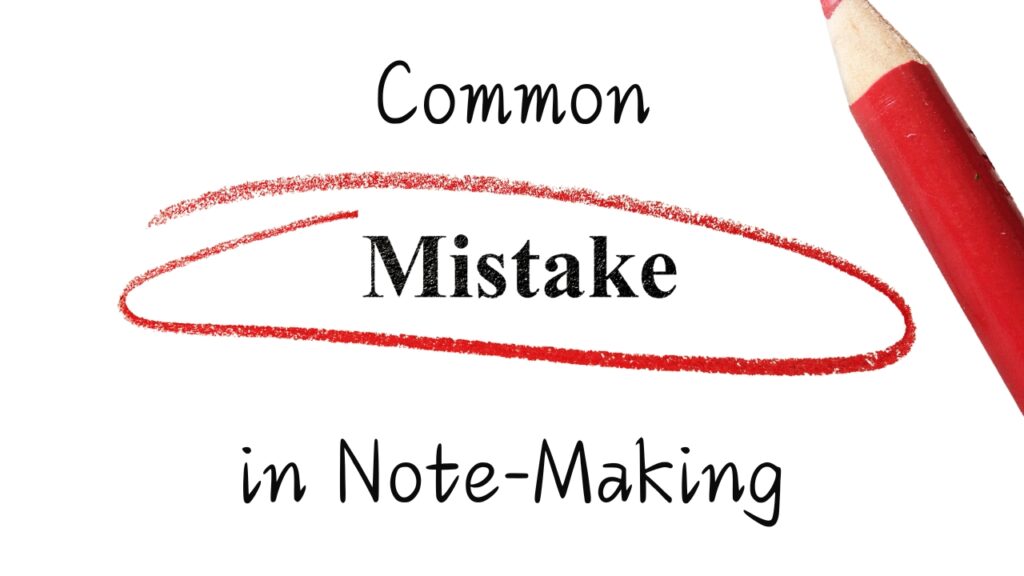Preparing for the UPSC mains exam is a challenging journey, and effective note-making plays a crucial role in navigating this path. Notes help you condense vast information into manageable chunks, making revision easier and improving retention. This blog explores various note making techniques for UPSC mains aspirants, ensuring your preparation is organized and efficient.
Why is Note-Making Important for UPSC Mains?
The UPSC syllabus for mains is extensive, covering a wide range of topics. Here are some key reasons why note-making is indispensable:
- Condensation of Information: The syllabus is vast, and concise notes help summarize important points.
- Ease of Revision: Well-structured notes are easy to revise, saving time during the final preparation phase.
- Better Retention: Writing and organizing information aids memory retention.
- Clarity of Concepts: Creating notes encourages aspirants to simplify and understand complex topics.
- Focus on Prioritization: Notes help you highlight the most critical areas of the syllabus, ensuring you allocate time effectively.
Types of Note-Making Techniques

1. Linear Notes
Linear notes are the traditional method of note-making, where information is written down in a sequential manner. This method is suitable for:
- Subjects with factual data, such as history and geography.
- Creating lists, definitions, or chronological sequences.
Tips for Effective Linear Notes:
- Use bullet points or numbered lists for clarity.
- Highlight key terms with colors or underlining.
- Keep sentences short and to the point.
- Use subheadings for better organization.
2. Mind Maps
Mind maps are a visual representation of information, connecting ideas around a central theme. This method is particularly helpful for:
- Complex topics like ethics or governance.
- Understanding interconnections between various subjects.
How to Create a Mind Map:
- Begin by placing a central idea at the center of the page.
- Branch out with related subtopics.
- Use arrows, diagrams, and colors for better visualization.
- Add keywords instead of long sentences for each branch.
3. Flowcharts
Flowcharts are an excellent way to represent processes, hierarchies, or sequences. This technique is ideal for:
- Topics like policymaking, economic reforms, or administrative structures.
- Subjects requiring a step-by-step explanation.
Creating an Effective Flowchart:
- Use boxes and arrows to represent steps or relationships.
- Place the central idea at the center of the page to create a logical and easy-to-follow flow.
- Label each box clearly with action words or specific terms.
4. Table Format
Tables are a great way to compare and contrast information. This method is suitable for:
- Analyzing pros and cons, features, or differences.
- Topics like governance policies, constitutional articles, or international relations.
Tips for Using Tables:
- Divide information into rows and columns.
- Keep the content concise and specific.
- Highlight the most important comparisons.
- Use headers to organize data for easy understanding.
5. Sticky Notes and Flashcards
These are portable and handy tools for quick revision. Use them for:
- Memorizing key terms, formulas, or definitions.
- Revising current affairs or quotes for ethics.
How to Use Sticky Notes Effectively:
- Write one concept or fact per note.
- Stick them on a wall or desk for frequent visibility.
- Categorize sticky notes by subject or topic for better organization.
Steps to Create Effective Notes

1. Understand the Syllabus and Exam Pattern
Before making notes, familiarize yourself with the UPSC mains syllabus and question patterns. This helps you identify relevant topics and avoid unnecessary details.
- Break the syllabus into smaller sections.
- Refer to previous years’ question papers to understand trends.
2. Use Multiple Sources
Refer to standard books, government reports, and current affairs materials. Ensure your notes integrate information from diverse and credible sources.
Recommended Sources:
- NCERT textbooks for conceptual clarity.
- Government publications like Yojana, Kurukshetra, and Economic Survey.
- Authentic news articles and PIB updates.
3. Focus on Keywords and Phrases
Avoid writing lengthy paragraphs. Instead, focus on:
- Keywords
- Important dates and facts
- Definitions and examples
Example: For a topic like “Fundamental Rights,” use concise points:
- Mention Articles (14-32).
- Highlight key features like justiciability and enforcement.
- Include landmark cases like Kesavananda Bharati.
4. Organize by Subject and Topic
Organize each subject into its own notebook or digital folder.Divide topics systematically, ensuring easy access during revisions.
Pro Tip: Color-code your notes for different subjects. For instance:
- Blue for polity.
- Green for environment.
- Yellow for economy.
5. Revise and Update Regularly
Keep your notes dynamic by:
- Adding new information from newspapers or recent developments.
- Revising them periodically to reinforce memory.
Revision Schedule:
- Weekly: Quick review of current affairs.
- Monthly: In-depth revision of one subject.
- Pre-Exam: Focus on concise notes and key topics.
Digital vs. Manual Note-Making

Digital Notes
- Advantages:
- Easy to edit and organize.
- Allows the use of multimedia elements like images and videos.
- Accessible across devices.
- Disadvantages:
- May lead to distractions.
- Requires electronic devices.
Manual Notes
- Advantages:
- Enhances memory through physical writing.
- Easy to customize with diagrams, charts, or drawings.
- No reliance on technology.
- Disadvantages:
- Time-consuming.
- Difficult to reorganize or edit.
Best Practice: Use a combination of both methods based on the subject and personal preference. For instance, use digital notes for current affairs and manual notes for static subjects.
Common Mistakes in Note-Making

- Overloading Notes: Avoid copying entire paragraphs from books or sources.
- Lack of Structure: Disorganized notes make revision difficult.
- Neglecting Revision: Notes are ineffective if not revised regularly.
- Ignoring Current Affairs: Ensure your notes incorporate recent developments and examples.
- Overdependence on Digital Tools: Avoid excessive reliance on apps or software that may disrupt your focus.
FAQ Section
Q1: Why is note-making essential for UPSC mains preparation?
Note-making helps condense the vast syllabus into manageable information, making revision easier and improving retention. It also aids in better understanding and clarity of concepts.
Q2: What are the best note-making techniques for UPSC mains?
Some effective techniques include linear notes, mind maps, flowcharts, tables, and using sticky notes or flashcards for quick revision.
Q3: Should I use digital or manual notes?
Both methods have their advantages. Digital notes are easier to edit and organize, while manual notes enhance memory retention. Use a combination based on your preference.
Q4: How can I ensure my notes are effective?
Focus on keywords and phrases, organize by subject, revise regularly, and integrate information from multiple credible sources.
Q5: How often should I revise my notes?
Revising notes periodically is crucial. Aim to revise your notes weekly or bi-weekly to reinforce memory and update them with current affairs.
Q6: What tools can I use for digital note-making?
You can use tools like Evernote, Notion, or Microsoft OneNote for organizing your digital notes. These platforms allow you to add multimedia and sync notes across devices.
Q7: How do I balance note-making and studying?
Allocate specific time slots for note-making and avoid spending excessive time on them. Focus on understanding concepts first and then creating concise notes.
Q8: Can I use pre-made notes available online?
While pre-made notes can be a starting point, it’s essential to customize them according to your understanding and add personalized examples or insights.
Q9: How can I improve my note-making speed?
Use abbreviations, symbols, and shorthand writing to save time. Practice summarizing information quickly and focus on extracting the essence of the content.
Q10: What should I do if my notes become too bulky?
Regularly review your notes and eliminate redundant or less relevant information. Focus on key points and ensure your notes remain concise and focused.
Conclusion
Effective note-making is a game-changer for UPSC mains preparation. By adopting the right techniques and staying consistent, aspirants can simplify their study process and enhance their performance. Remember, the quality of your notes matters more than the quantity. Tailor your approach to suit your learning style, and let your notes become the key to unlocking success in the UPSC mains exam.
If you enjoyed this blog, don’t miss out on our previous one Top 10 Best UPSC Mock Interview Platforms
Are you Preparing for the IAS exam? A journey that demands dedication, strategic planning, and consistent effort. Learn Common Mistakes to Avoid During IAS Preparation




